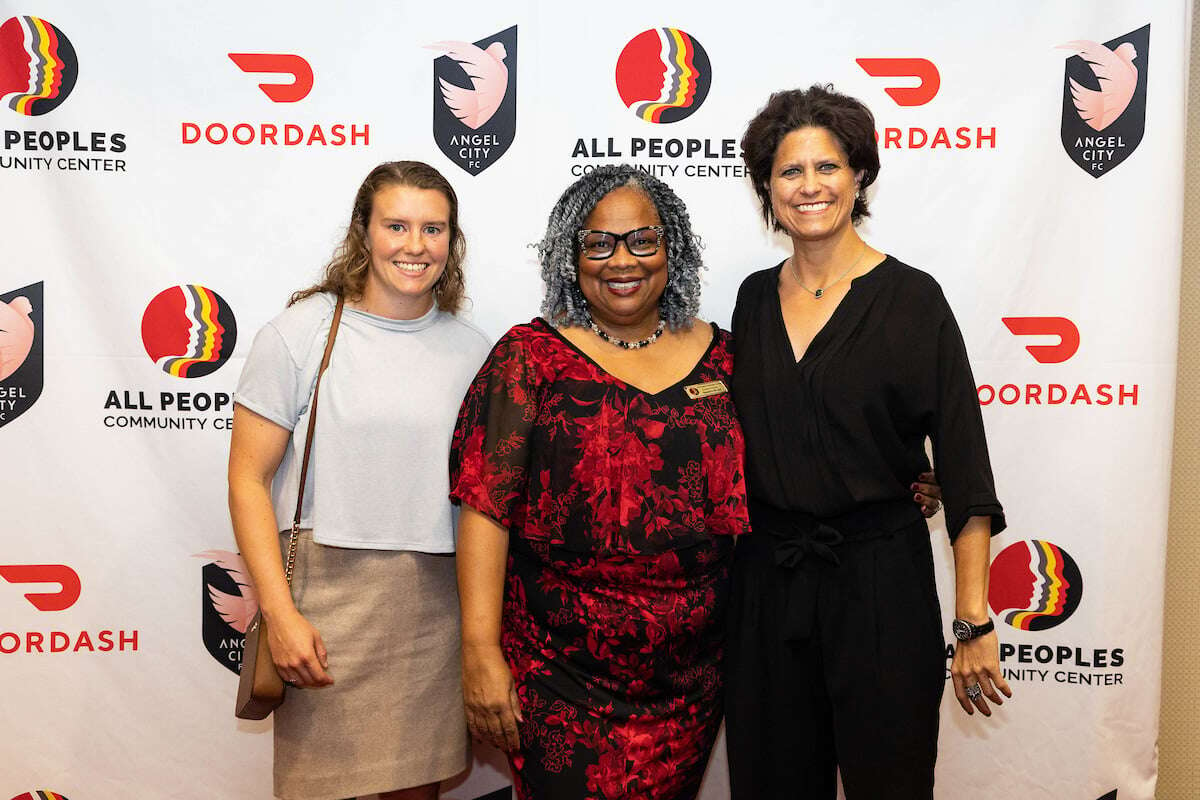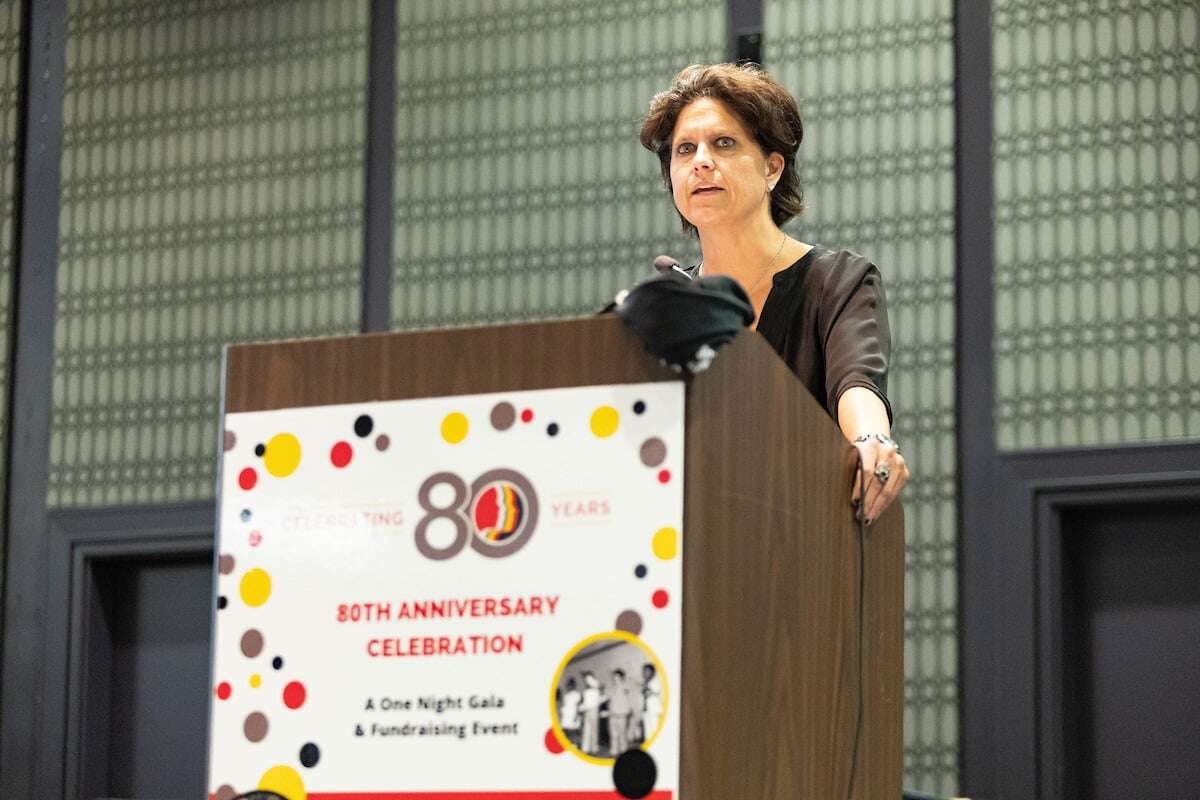.png?width=520&height=294&name=IMG_2277%20(1).png)

Note: this is the second in a four-part series about Angel City's unique impact model. You can read the first entry here.
According to the LA Food Policy Council, Los Angeles is home to the largest population of food insecure people—meaning people living with limited or uncertain access to adequate food—in the country. As Angel City built its 10% impact model, it was clear that hunger was a foundational issue.
“Before anybody can think about setting foot on a pitch,” says Head of Community Catherine Dávila, “They have to have a full belly.”
In the first installment of this series, we introduced the 10% Model and its three pillars: essentials, equity, and education. This week, we’re zooming in on the essentials pillar with a close look at one of Angel City’s community partners, All People’s Community Center (APCC), which is one of two partners addressing food security (the other is the Los Angeles LGBT Center). DoorDash, the corporate partner supporting the initiative, split its contribution between the two organizations. AngelCity.com spoke with Capri Downs, APCC’s food security coordinator, about their food programs.
The nonprofit’s food security initiative has four programs within it—three of which Angel City and DoorDash support—all addressing different needs in the community.
First, there’s the senior delivery program, a service that brings groceries to seniors and other homebound people who live within a 12-mile radius of the Center in South LA. Twice a month, participants get a bag of dry goods—which can include pasta, canned goods, bread, tortillas, and other non-perishable foods—and a bag of fresh produce from a local grocer.
“There aren't a lot of programs to deliver to people who are homebound,” says Downs. APCC’s deliveries took on a new urgency during the depths of the COVID pandemic, when many people were stuck at home. “Our seniors and people who are disabled were getting left behind. This program helped them get the food they needed to sustain themselves, because they're not able to go to the grocery store.”
While other grocery delivery services exist, many participants can’t afford to pay for them. “They can put that money that they're saving towards rent, or medicine, or anything else they need,” says Downs.
According to Downs, 174 seniors are currently enrolled in the program. “We're still in the process of hopefully expanding so that we're recruiting more seniors,” she says. “We're always looking for more people to join our program.”
Next, every Friday, APCC distributes groceries onsite through their supplemental food program, which is targeted at families in emergency need. Participants can pick up non-perishable food as well as fresh produce, dairy, eggs, and meat, which is donated by the LA Regional Food Bank. In addition to groceries, the center also provides hygiene products and diapers, as well as connecting families with benefits they might be eligible for.
Third, APCC is in the process of taking over a community garden, formerly overseen by the American Friends Service Committee, located across the street from the center (Angel City and DoorDash are not involved with the garden, which is funded separately). They just hired a community farm facilitator to serve as “that link between the community and the farm and All Peoples,” says Downs.
“Right now they're in that transitional period where they're moving on to the winter crops,” she continues. “So you'll see a lot of squash and pumpkins growing up. Corn, kale, basil… they really emphasize having the community be self-determined and self-reliant by growing their own food.”

Finally, APCC partners with Best Start to offer monthly food assistance, as well as hygiene products, to families with children under 18.
All told, the food security programs supported by Angel City and DoorDash have distributed 360,000 meals this year with a month and a half still to go—well beyond the original goal of 130,000 for the year.
Grocery delivery is one of the more visible initiatives of Angel City’s impact model—you’ve probably seen the in-stadium announcements for Goals that Give, which releases meals within APCC’s food security programs—but DoorDash’s involvement goes beyond just paying for groceries. For one thing, it’s DoorDash who pays their drivers to physically deliver to participants in the senior program.
In addition, their contribution is what enabled APCC to hire Downs. “My position was created to bring all of these food programs together and expand them to reach more people in the community,” she explains. “We've had these food programs for a while, but they were kind of operating independently. So I'm really here to make these programs work cohesively together.”
Among Downs’s responsibilities has been a wide-scale evaluation of the programs’ effectiveness. “We're just going one by one through each program, asking participants to rate the products that they receive, how much of it they use, how it’s changed their eating habits,” she says. “Now we're going over the data and seeing, what kind of changes can we make to this program to have a bigger impact for the community?”
Some participants in the senior program, for example, have requested perishable foods like meat and dairy in addition to the dry goods and produce they already receive. From there the challenge, Downs says, becomes, “how can we get colder items delivered to our seniors who are asking for this stuff?”
Crucially, APCC’s work isn’t just about nutrition, but also bringing people together. The people enrolled in their food programs aren’t just recipients of aid, they’re also community members with important contributions to make.
Downs mentions one participant in the senior program, Johnny, who was a music teacher in his younger days. “He said, ‘I really appreciate the service that you guys offer because I used to volunteer at the food banks. I'm not as young as I used to be. I don't make as much money as I used to… I kind of wanted to give back and hopefully I could play music for you guys at the center.’”
He hasn’t had the opportunity yet—maybe at the Center’s Thanksgiving celebration, Downs says—but he’s not the only enrollee eager to give time and energy back to the program that’s done so much for him.
“We have seniors here at the center who volunteer,” says Downs. “They're part of our RSVP program, which stands for Retired Seniors Volunteer Program, and they help bag groceries for our senior delivery at our Friday program.” It just goes to show how meeting people’s basic needs has a ripple effect through the life of the community.





